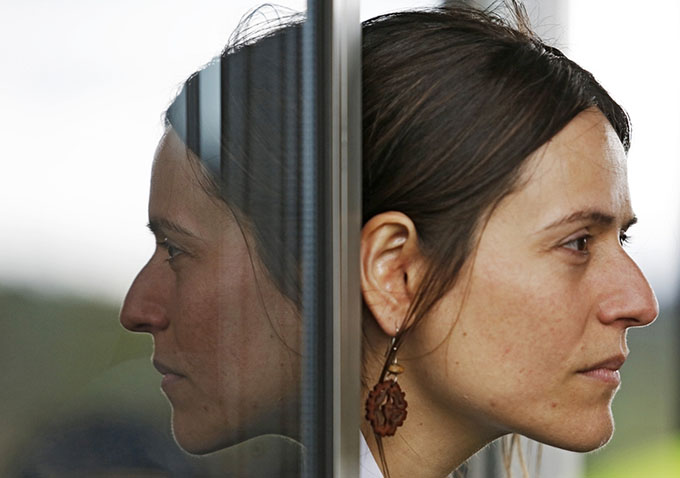 Flowers fill an interesting space in life. They are offerings of romance, well-wishes for the sick, tokens of loss for the departed. But more than anything, they are gifts, given, no matter the circumstance, to express thought and care and love. Even those pinned to highway signs and stacked beside crosses planted in remembrance along busy roads. There, like at a cemetery, they are a message, a reminder that those departed have not been forgotten. It is from this complex array of meaning that Spain’s Basque-language “Loreak” (which has been translated to “Flowers” for it’s English title) builds from. A quiet, elegant study of those at their most stagnant, Jon Garaño and Jose Mari Goenaga’s second feature is an exploration of grief, who owns it, who has a right to it, and how to handle it.
Flowers fill an interesting space in life. They are offerings of romance, well-wishes for the sick, tokens of loss for the departed. But more than anything, they are gifts, given, no matter the circumstance, to express thought and care and love. Even those pinned to highway signs and stacked beside crosses planted in remembrance along busy roads. There, like at a cemetery, they are a message, a reminder that those departed have not been forgotten. It is from this complex array of meaning that Spain’s Basque-language “Loreak” (which has been translated to “Flowers” for it’s English title) builds from. A quiet, elegant study of those at their most stagnant, Jon Garaño and Jose Mari Goenaga’s second feature is an exploration of grief, who owns it, who has a right to it, and how to handle it.
Ane (Nagore Aranburu) is lost. By no means old enough, she is diagnosed with early onset menopause. She stumbles listlessly through her days, locked into a set routine, devoid of surprise. Soon, though, the titular flowers begin arriving for her every Thursday. The flowers, clearly pricey bouquets, come sans note and card, completely anonymous. Soon Ane’s husband Ander (Egoitz Lasa) has had enough, but Ane already clings to the attention — the flowers are beautifully lensed as the only colorful aspect of her day. So, to keep her secret, she begins spiriting them to her office, away from Ander’s prying eyes.

Beñat (Josean Bengoetxea) is a crane operator at the same job site where Ane works. His life, much like Ane’s, is one of somber tones. As played by Bengoetxea, Beñat is hollowed, a man pushing through the monotony of life, though still capable, from time to time, of small moments of joy. At home he struggles to navigate the disdain his mother and wife share for each other, while at work, he watches the world from far above through his binoculars. Then, almost as quickly as we got to know him, Beñat dies, and “Loreak” switches gears, from a small film about the unnoticed connections in our lives and our impacts upon others, to one of loss, of grief, of the journeys of the bodies left behind.
After Beñat’s death, much of the film’s focus shifts to his wife, Lourdes (Itziar Ituño). Unable to cope and never truly welcomed into Beñat’s family, she is left to grieve in the company of those who don’t understand. Meanwhile Beñat’s mother, Tere (an excellent Itziar Aizpuru) battles to uphold the memory of her son, oft repeating the refrain, “No one is dead until they are forgotten.” And once again, flowers enter the picture, left regularly at the sight of the accident that took Beñat’s life.

“Loreak” is a film of perspective and ownership. It glides from story to story, layers overlapping, slipping in and out of time, to examine the ripple effect of death, the magnificent impact a person can have on individuals in the periphery of their life. But more than this, it is a meditation on grief and the jealousy and guilt that can worm into the empty space loss has carved. Who has a right to grieve for Beñat? Who has a right to be leaving flowers? More still: What is the proper way to grieve? And when is it okay to move on?
Well acted from start to finish, much of “Loreak” is told in looks and glances. These are people most often alone, deeply wounded, completely vulnerable, and the performances deftly rise to the challenge. Ituño’s Lourdes especially, as the scorned widow. Lourdes vacillates through the gamut of mourning, her arc taking what is likely the most painful turn of all by the end, culminating in a melancholic yet resilient heartbreak.

The film, for all its grace and beauty (Basque country is beautifully if wistfully captured by DP Javier Agirre Erauso), falters in the execution of the many perspective shifts. Necessary as these shifts are to the story unfolding, “Loreak” tends to linger too long in one place, or pull us away from a character just when things have gotten good. The film is also awkwardly and unnecessarily split into chapters, their titles painfully on the nose — the script and actors say far more than the obvious labels.
Letting such a film slip into the melodramatic could have been very easy. But Garaño and Goenaga tactfully navigate the delicacies of death and the difficulties (and guilt) of life with a quiet poise that make for a film that is as enriching as it is disheartening. [B]

